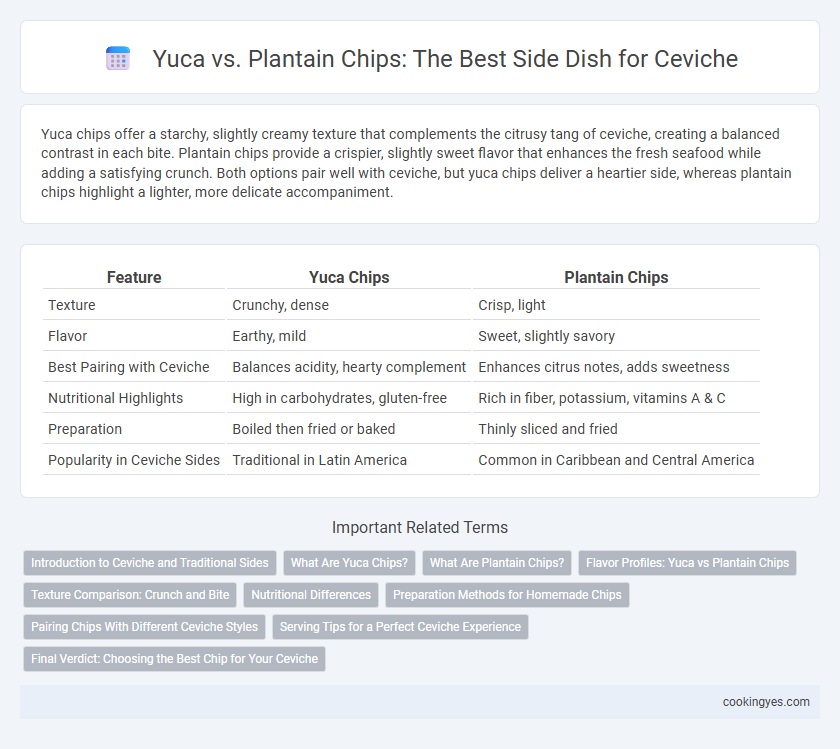Yuca chips offer a starchy, slightly creamy texture that complements the citrusy tang of ceviche, creating a balanced contrast in each bite. Plantain chips provide a crispier, slightly sweet flavor that enhances the fresh seafood while adding a satisfying crunch. Both options pair well with ceviche, but yuca chips deliver a heartier side, whereas plantain chips highlight a lighter, more delicate accompaniment.
Table of Comparison
| Feature | Yuca Chips | Plantain Chips |
|---|---|---|
| Texture | Crunchy, dense | Crisp, light |
| Flavor | Earthy, mild | Sweet, slightly savory |
| Best Pairing with Ceviche | Balances acidity, hearty complement | Enhances citrus notes, adds sweetness |
| Nutritional Highlights | High in carbohydrates, gluten-free | Rich in fiber, potassium, vitamins A & C |
| Preparation | Boiled then fried or baked | Thinly sliced and fried |
| Popularity in Ceviche Sides | Traditional in Latin America | Common in Caribbean and Central America |
Introduction to Ceviche and Traditional Sides
Ceviche, a classic Latin American dish made from fresh raw fish cured in citrus juices, is traditionally served with crunchy sides that complement its tangy flavors. Yuca chips offer a starchy, mildly sweet contrast with a crispy texture, while plantain chips provide a slightly sweeter and thinner bite, enhancing the overall balance of ceviche. Both sides emphasize regional authenticity and add a satisfying crunch essential to the dish's traditional presentation.
What Are Yuca Chips?
Yuca chips, made from the starchy root vegetable cassava, offer a crispy and slightly sweet contrast that complements the tangy flavors of ceviche. Unlike plantain chips, which are derived from green bananas and have a natural sweetness and softer texture, yuca chips provide a firmer crunch and a more neutral taste, allowing the citrus and seafood in ceviche to stand out. Their gluten-free and high-fiber properties make yuca chips a popular, health-conscious side choice for ceviche enthusiasts.
What Are Plantain Chips?
Plantain chips are thinly sliced, fried, or baked pieces of unripe green plantains, known for their crispy texture and slightly savory flavor, making them an ideal accompaniment to ceviche. Rich in fiber and potassium, plantain chips contrast the tangy, citrusy notes of ceviche with a satisfying crunch and mild sweetness. Unlike yuca chips, which offer a denser texture and earthier taste, plantain chips provide a lighter, more delicate bite that complements the fresh seafood flavors of ceviche perfectly.
Flavor Profiles: Yuca vs Plantain Chips
Yuca chips offer a mild, slightly nutty flavor with a crispy texture that complements the bright, citrusy notes of ceviche without overpowering them. Plantain chips present a sweeter, more robust taste with a hint of caramelization, providing a contrasting balance to the tangy and acidic flavors of the marinated seafood. Choosing between yuca and plantain chips depends on whether you prefer a subtle, neutral side or a sweeter, more flavorful accompaniment to your ceviche.
Texture Comparison: Crunch and Bite
Yuca chips boast a dense, starchy crunch that provides a hearty, substantial bite, complementing the light, citrusy ceviche. Plantain chips offer a thinner, crisper texture with a slightly sweet undertone, creating a contrast to the ceviche's fresh acidity. Choosing between yuca and plantain chips depends on whether you prefer a robust crunch or a delicate crispness alongside your ceviche.
Nutritional Differences
Yuca chips offer higher fiber content and more complex carbohydrates compared to plantain chips, providing sustained energy and improved digestion. Plantain chips contain more potassium and vitamin A, supporting heart health and immune function. Both options vary in fat content depending on preparation, with baked versions offering healthier profiles ideal for ceviche accompaniments.
Preparation Methods for Homemade Chips
Yuca chips require peeling, boiling until tender, thin slicing, and frying to achieve a crispy texture that balances ceviche's acidity. Plantain chips involve slicing unripe green plantains thinly, frying until golden and crisp, which adds a slightly sweet and starchy contrast to ceviche flavors. Both preparation methods emphasize controlling oil temperature and slicing uniformity to ensure even cooking and optimal crunchiness.
Pairing Chips With Different Ceviche Styles
Yuca chips offer a dense, starchy texture that pairs exceptionally well with creamy and rich ceviche styles like Peruvian leche de tigre, balancing acidity with their subtle earthiness. Plantain chips, with their natural sweetness and crispiness, complement tangy and spicy ceviches commonly found in Caribbean and Central American cuisines, enhancing the vibrant flavors and adding a satisfying crunch. Selecting the right chip depends on the ceviche's flavor profile, where yuca chips suit milder, citrus-forward preparations, and plantain chips elevate bold, spicy versions.
Serving Tips for a Perfect Ceviche Experience
Yuca chips offer a dense, starchy texture that complements ceviche's citrusy flavors, providing a satisfying crunch without overpowering the dish. Plantain chips deliver a slightly sweet, crispy contrast, enhancing the freshness of ceviche with their natural caramel notes. Serving yuca or plantain chips chilled alongside ceviche ensures a refreshing balance of textures and temperatures for an authentic and enjoyable experience.
Final Verdict: Choosing the Best Chip for Your Ceviche
Yuca chips offer a crispy, slightly nutty flavor that complements the zesty, citrus notes of ceviche, while plantain chips provide a sweeter, crunchier contrast enhancing the dish's freshness. Nutritionally, yuca chips tend to be lower in sugar and higher in fiber compared to plantain chips, making them a healthier accompaniment. The final verdict depends on preference: choose yuca chips for a savory, textural balance or plantain chips for a sweeter, vibrant pairing with ceviche.
Yuca vs plantain chips for ceviche side Infographic

 cookingyes.com
cookingyes.com